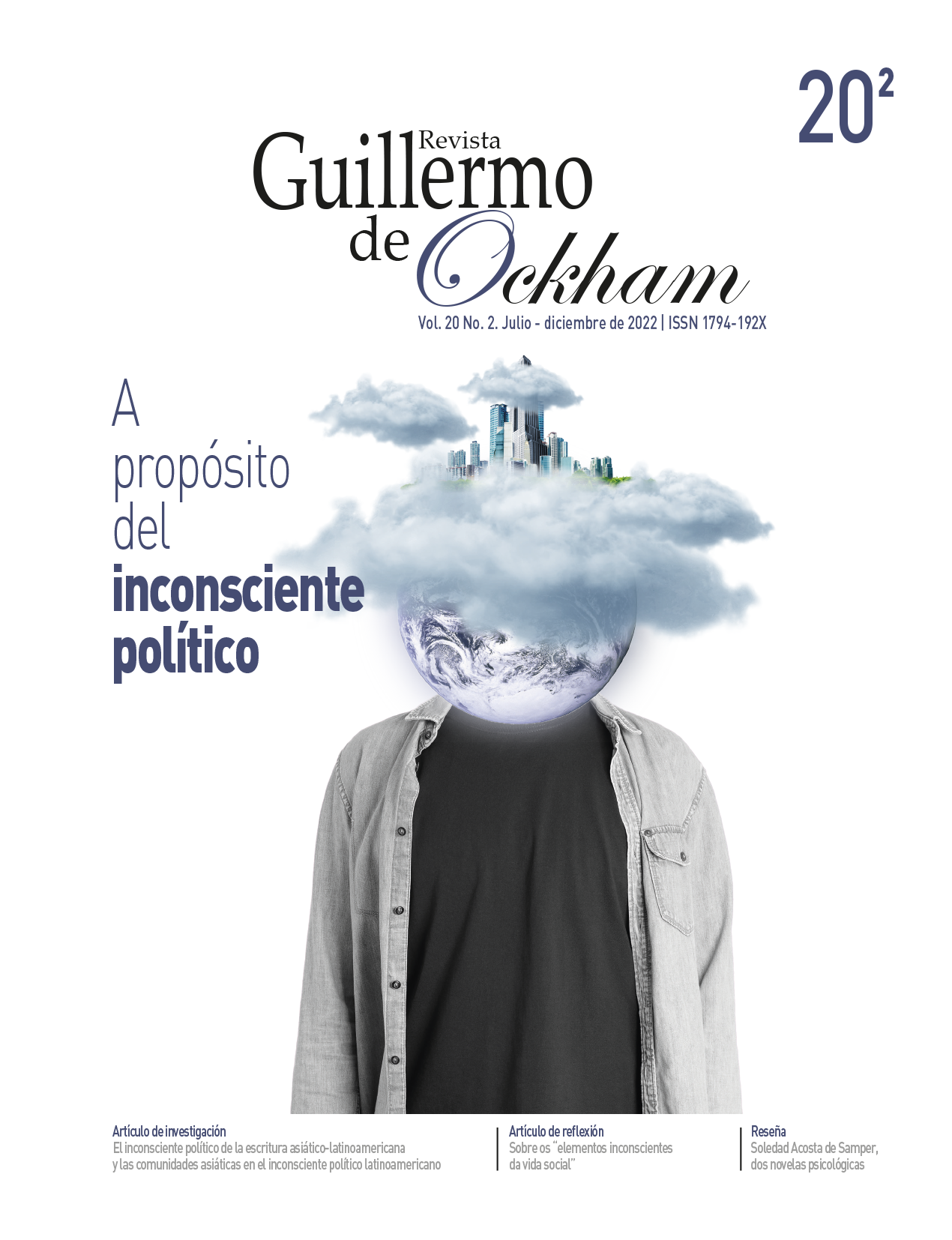The Revista Guillermo de Ockham provides an immediate and open access to its content, based on the principle of offering the public a free access to investigations to provide a global interchange of knowledge.
Unless otherwise established, the contents of this journal has a license with Creative Commons Attribution-NonCommercial-NoDerivatives 4.0 International (CC BY-NC-ND 4.0) http://creativecommons.org/licenses/by-nc-nd/4.0/
- Attribution: You must give appropriate credit, provide a link to the license, and indicate if changes were made. You may do so in any reasonable manner, but not in any way that suggests the licensor endorses you or your use.
- NonCommercial: You may not use the material for commercial purposes.
- NoDerivatives: If you remix, transform, or build upon the material, you may not distribute the modified material.
- No additional restrictions: You may not apply legal terms or technological measures that legally restrict others from doing anything the license permits.
Resumo
The question about whether there is a political unconscious can be understood in two ways. First, it could refer to whether our unconscious (in the Freudian or Lacanian sense) is political. Secondly, the question could mean: are there political (social, economic...) structures, institutions, and processes that are unconscious, in the sense that we do not perceive them “normally” (whatever that means exactly) nor reflect on them? I want to focus on this second meaning and, above all, discuss the question of whether "technology is society made durable" (Latour). In other words: is technology a manifestation of the political unconscious?
Referências
Akrich, M. / Boullier, D. (1996). Le mode d'emploi: genese, forme et usage. En: D. Chevallier (Ed.), Savoir faire et pouvoir transmettre. Editions de l’EHESS. pp. 112-131.
Althusser, L. (1971). Lenin and philosophy and other essays. Monthly Review Press.
Baudry, J. L. (1974/75). Ideological effects of the basic cinematographic apparatus. Film Quarterly (28)2, pp. 39-47.
Beller, J. (2021). The world computer. Derivative conditions of racial capitalism. Duke University Press.
Callon, M. (2005). Why virtualism paves the way to political impotence. Callon replies to Miller. En: Economic Sociology. European Electronic Newsletter (6)2, pp. 3-20 (http://econsoc.mpifg.de/archive/esfeb05.pdf).
Castoriadis, C. (1978). Les carrefours du labyrinth. París.
Freundinnen und Freunde der klassenlosen Gesellschaft (2018). Umrisse der Weltcommune (https://kosmoprolet.org/de/umrisse-der-weltcommune).
Giest, J. (2016). Zur Frage nach der ‘kapitalistischen Technik’. Für eine neue Debatte über die reel-le Subsumtion der Produktion unter das Kapital. En: Zeitschrift für kritische Sozialtheorie und Philosophie (3)1, pp. 26-50.
Heidegger, M. (1977). The question concerning technology and other essays. Garland Publishing.
Ihde, D. (1990). Technology and the lifeworld. From garden to earth. Indiana University Press.
Jameson, F. (1981). The political unconscious. Narrative as a socially symbolic act. Cornell Uni-versity Press.
Joerges, B. (1999). Do politics have artefacts? En: Social Studies of Science, 29(3), pp. 411-431.
Katz, Y. (2020). Artificial whiteness. Politics and ideology in artificial intelligence. Columbia Uni-versity Press.
Kunzru, H. (1997). You are cyborg. [A conversation with Donna Haraway]. Wired, 1.2.1997, https://www.wired.com/1997/02/ffharaway/
Kurz, R. (2004). Blutige Vernunft. Essays zur emanzipatorischen Kritik der kapitalistischen Mo-derne und ihrer westlichen Werte. Horlemann.
Latour, B. (1991). Technology is society made durable. En: J. Law (Ed.). A sociology of monsters Essays on power, technology and domination. Routledge. pp. 103-132.
Marx, K. (1976). Capital, Vol. 1. Penguin.
Marx, K. (1981). Capital, Vol. 3. Penguin.
Marx, K. (1988). Das Kapital. Dritter Band. MEW 25. Dietz.
Noble, S. U. (2018). Algorithms of oppression. How search engines reinforce racism. New York: University Press.
Panzieri, R. (1972). Über die kapitalistische Anwendung der Maschinerie im Spätkapitalismus. En: C. Pozzoli (Ed.). Spätkapitalismus und Klassenkampf. Eine Auswahl aus den Quaderni Ros-so. Europäische Verlagsanstalt. pp. 14-32.
Thrift, N. (2004). Remembering the technological unconscious by foregrounding knowledges of position. En: Environment and Planning D: Society and Space 22, pp. 175-190.
Winner, L. (1980). Do artefacts have politics? En: Daedalus (109)1, pp. 121-136.

 Perfil Google Scholar
Perfil Google Scholar






























